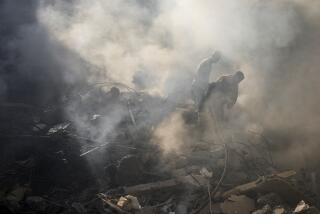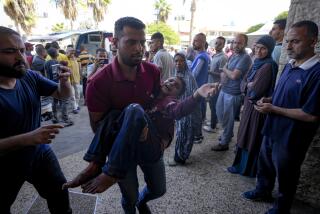Israeli Offensive Is Met With Criticism and Rage
MOSCOW — European nations demanded Saturday that Israel immediately comply with a U.N. Security Council resolution and end its siege of Palestinian leader Yasser Arafat’s compound.
From Moscow to Paris, European governments also warned Israel that it could not disregard Arafat, whom the Israeli government blames for not doing enough to stop deadly attacks against its citizens.
“It would be a grave mistake to imagine that the elimination of Yasser Arafat, the president of the Palestinian Authority, could lead to anything positive,” French President Jacques Chirac told RTL radio.
Israel has said it doesn’t intend to harm Arafat, but it insists that the raid on his offices is necessary to stop militant attacks.
The Israeli siege provoked a second day of protests across the Middle East. Burning American and Israeli flags, tens of thousands of protesters took to the streets in Iraq, Lebanon, Libya and Yemen. Smaller anti-Israeli demonstrations were held in Egypt, Jordan, Bahrain, Syria and Kuwait.
The United States, Israel’s closest ally, joined other members of the Security Council in approving the resolution Saturday.
“Russia demands that the parties fully and immediately observe all provisions of this resolution,” Russian Foreign Minister Igor S. Ivanov said, adding that he was immediately instructing Russia’s envoy to the Middle East, Andrei Vdovin, to initiate talks with both sides.
Spanish Prime Minister Jose Maria Aznar, whose country holds the rotating presidency of the European Union, said the Israeli siege in the West Bank city of Ramallah “will exacerbate a situation which is already causing great instability and, most of all, a huge number of mortal victims.”
In Paris, more than 1,000 people demonstrated against the policies of Israeli Prime Minister Ariel Sharon, many carrying Palestinian flags and chanting anti-Israel slogans. Similar demonstrations were held in smaller French cities and in Berlin, the German capital.
Italian Prime Minister Silvio Berlusconi sent a message to Arafat, through the Italian consul general in Jerusalem, to “express his concern over the dramatic developments of the last hours and his hope that all violence stop immediately.”
In Athens, a cross-party group of Greek lawmakers delivered a letter of protest to the Israeli Embassy about the troop movements.
“Any attempt against the life of Yasser Arafat will lead to extensive bloodshed in the region,” said former Foreign Minister Theodoros Pangalos, representing Greece’s governing Socialists.
In Turkey, Prime Minister Bulent Ecevit warned that Israel’s actions threatened the whole of the Middle East. Ecevit called on the United States to rein in Sharon’s government.
In the Arab world, the support for the Palestinians was unqualified. Jordan’s King Abdullah II used a telephone conversation with President Bush to urge him to swiftly intercede with Israel to end its “aggression on the Palestinian people and the siege on President Arafat.”
After an emergency meeting of the Arab League, Secretary-General Amr Moussa said its members disagreed with U.S. calls for Arafat to rein in militants.
“How [can Arafat act first] while Israeli troops are a few meters away from his office?” Moussa said Saturday.
Egyptian Foreign Minister Ahmed Maher said he was disappointed that the United Nations resolution was not stronger, but he added that Israel must abide by the ruling.
In Britain, Foreign Minister Jack Straw appealed to both sides to show restraint.
More to Read
Sign up for Essential California
The most important California stories and recommendations in your inbox every morning.
You may occasionally receive promotional content from the Los Angeles Times.










